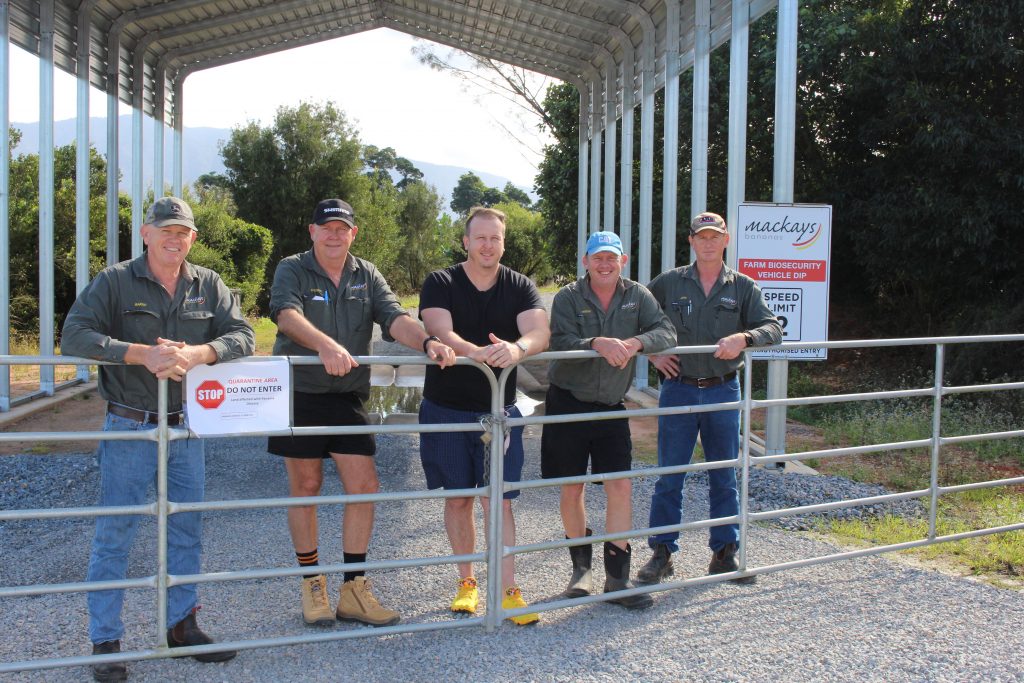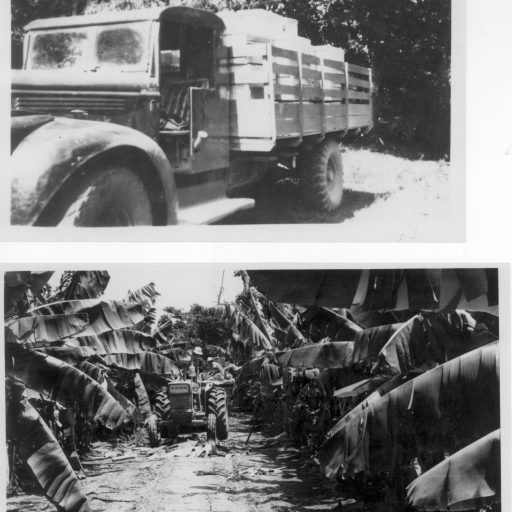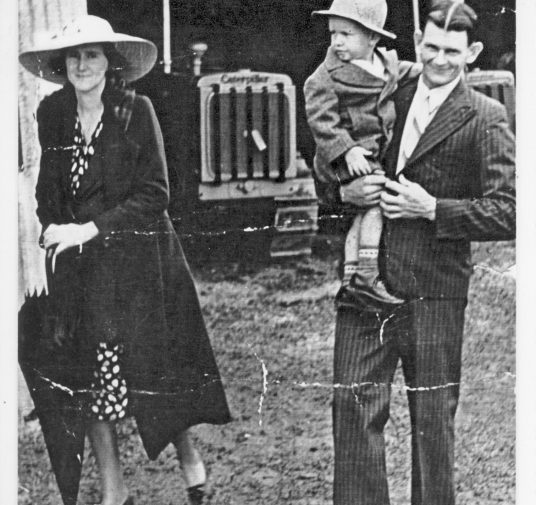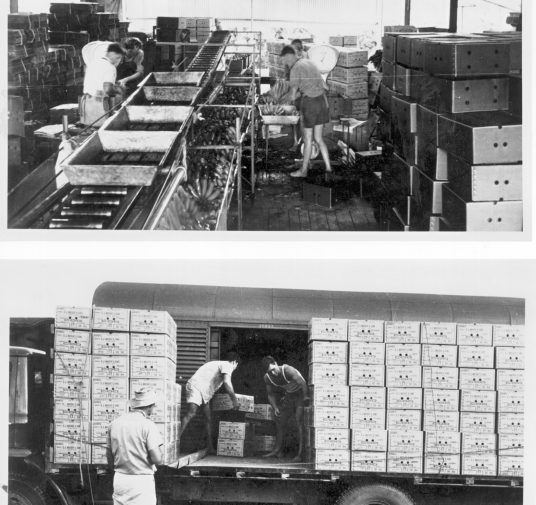
By Lea Coghlan
STANLEY’S LEGACY
When Stanley Mackay established a company to run his banana farm in Tully, Far North Queensland, 75 years ago, few would have predicted it would become the thriving, sustainable and forward-looking enterprise it is today.
It may look a little different to what he envisioned – four generations, seven farms, three growing regions, five agricultural commodities and 550 plus staff – but its success is testament to Stanley’s tenacity and foresight, and the commitment by his children, grandchildren and great grandchildren to continue and build on his legacy.
Stanley was no stranger to the Far North, having done several stints cane cutting before he and his new wife Agnes made the permanent move to Tully from Nambour in the mid 1930s.
On arrival, Stanley continued to cut cane and in 1945 the couple leased a rainforest block near Mission Beach where they cleared the land by hand and planted bananas.
“When they bought their first farm of 36 hectares in 1954, our fathers, John and Robert, joined the business,” Stanley’s grandson Barrie Mackay said. It heralded the beginning of SJ Mackay & Sons, later rebranded as Mackays.
“From a young age, our fathers were part of the business. That mantra continues today. Stanley always led the charge but at the end of the day it was always a team effort.”
During Stanley’s reign at the helm, more farms around Tully were added as the Mackay children and grandchildren joined the business.
He lived long enough to watch the business start to diversify, initially into sugar cane.
Regarded as the grandfather of the modern-day banana industry, Stanley was a pioneer in so many ways.
In the region’s fledgling banana industry, Stanley lobbied for better rail services for Tully growers. He was the first grower to send fruit to Brisbane, Sydney and Melbourne, and later to Adelaide and Perth, opening up a world of trading opportunities.
He initiated the change from wooden crates to waxed cardboard boxes, albeit with some initial industry resistance, paving the way for greater packing efficiencies.
Stanley spent 27 years representing the industry on the COD Fruit Sectional Committee (a predecessor to the Australian Banana Growers’ Council), travelling the east coast of Queensland for meetings – largely at his own expense – for the betterment of the industry.
“Stanley overcame many hurdles,” Gavin Mackay said. “In the early days, there was only sugar cane grown here.
“There was no infrastructure for bananas. Stanley introduced all the things into the area that we now take for granted.”
Stanley made an ever-lasting impression on his family who continue today to uphold his strong work ethic, resilience and respect. Their journey has had its challenges.
Mother Nature has wiped out crops while a devastating banana disease was found on one of the family’s farms turning life as they knew it, on its head.
More recently, the global health pandemic and restrictions on travel and social distancing have created more challenges, in an industry that relies heavily on backpackers and seasonal workers.
Yet as their fathers and grandfather did before them, the current pillars of the family take it all in their stride.
“The resilience you gain from going through challenges like cyclones, Panama TR4 and others, gives you a level of resilience to be able to confront anything thrown at you,” Stephen Mackay added.
“It’s how you treat the challenge that defines the success.”
And what do they think Stanley would be thinking of the modern-day business?
“I think Grandad would be content and humbled to see how much we have grown,” Daniel Mackay said. “He was very much that as a person – humble and content.”

LOOKING BEYOND BANANAS
While banana growing remains 90 per cent of the Mackays core business, biosecurity, weather and land suitability have been the driving force for diversification into other agricultural industries and regions.
Finding crops most suited to growing conditions in the Wet Tropics was a key factor early on, so a foray into sugar cane in 1985 was a natural progression.
Today, the Mackay family grows more than 1000 ha of cane and is one of the largest cane suppliers to Tully Sugar.
“We considered the move a cyclone strategy as well, as cane only lies down and can still be harvested after a cyclone, whereas bananas can be totally wiped out,” Gavin Mackay said.
In 1991, the family purchased Bolinda Estates – 1456 ha of prime grazing land that formed part of King Ranch – which steered them to livestock.
“When we purchased our property at the top of the Tully River, some of the land was suitable for growing bananas, but the rest was not suitable for cane as it was too hilly,” Stephen Mackay said.
“Because it was previously a cattle property, we kept banana farming with cattle. It mows the grass and pays the rates and gives us a bit of fun playing with something different.”
Today, the family runs a 800-head commercial beef cattle herd on 400 ha.
In 2006, the family’s main banana plantation was wiped out by Tropical Cyclone Larry, prompting a decision to explore higher ground. In 2008, the family started growing red papayas.
“We undertook a diversification program away from the main banana farm at Tully,” Barrie Mackay explained.
“We were looking at ways to get away from the coast, and the impact of cyclones and floods.
“We moved to the top of the Tully Valley and then moved across the valley. It was okay for some of the cyclones, but not the big events like Cyclone Yasi which took the whole lot out.
“This prompted a move to a new area where we could separate our farms apart, to reduce the biosecurity risk and the impact of cyclones.”
Lakeland, with its rich fertile soil and optimal growing conditions beckoned, and in 2012 Mackays purchased Gold Tyne, where they grow bananas, avocadoes and lychees.
In 2015 the family ventured south to Bundaberg where they also grow bananas, avocados and lychees. Daniel Mackay believes geographic diversification has been one of the greatest challenges for the family operation.
“Our geographical diversification to Lakeland and Bundaberg and the fact that we have to run those farms remotely is a huge challenge,” he said.
“But the fact that we are doing it is a huge triumph for us personally, and for our business as it gives us continuity.”
Despite diversifying into new crops and regions, Mackays has stayed true to the crop that began the legacy – bananas – and constantly looks to improve through value-adding.

A GAME CHANGER
When Mackays decided to grow avocadoes three years ago, not only were they trying a tree crop for the very first time they did so using an innovative growing system.
In a nod to the innovation that grandfather Stanley displayed decades earlier, the Mackay cousins are using a trellis system – believed to be a first for the Australian avocado industry – to grow avocadoes at their farms in Lakeland and Bundaberg.
The Mackays drew on the experiences of Mission Beach rare tropical fruit grower Peter Salleras, who trialled and introduced the Tatura trellising methods on his farm after being wiped out by two cyclones.
“Growing avocados traditionally you have about 150 trees to a hectare in an orchard,” Cameron Mackay explained.
“Under the trellis system, we have a density of 2200 trees per hectare.
“We’ve modelled it on the apple industry which moved from tree crops to a trellis system to increase productivity and reduce labour costs.”
The Mackays planted 16 ha at Gold Tyne and 25 ha at Bundaberg.
The Lakeland orchard grows the Maluma avocado, a newer variety which has a smaller seed, bigger fruit and is slightly earlier maturing, and is under netting.
Aside from the harvest efficiencies, Stephen Mackay said growing avocados on a trellis system provided a layer of protection.
“There’s a lot of models in Australia where horticultural producers are putting their crops in a protected agricultural space,” Stephen Mackay explained.
“When we made the decision to start growing avocadoes, we wanted to make sure we weren’t going to get wiped out.
“Typically, in the tropical part of the world there is the story of people who grow big horticultural trees for 10 years and a cyclone comes along, wipes them out and they have to start again.
“We do believe if a cyclone went through Lakeland or Bundaberg, we would be the producer that’s first back on-line with a crop because we didn’t lose our trees out of the ground.”
SUCCESS
In a world where corporate giants dominate, it’s inspiring to find a successful farming family enterprise that spans four generations, multiple crops and a labour force of more than 550 people.
“We work to a common goal,” Cameron Mackay said.
“We will sit down and talk about what we want to do and when we leave the room we go and do it.
“We challenge each other – if you are not challenging each other at work I think you are giving up too early or giving up on something you should have fought for.”
Stephen Mackay remembers the robust conversations between his father Robert, Uncle John and grandfather.
“It got pretty colourful as they were very boisterous with their opinions,” he said.
“But come Friday afternoon, once they finished smoko the conversation would turn to where they were going fishing together.
“There was a great appreciation of the difference between business and family. You could have a strong opinion one way or another and not agree with each other. It was important that they held each other to account.”
Daniel Mackay believes Mackays is a unique family operation, that presents both challenges and rewards.
“The uniqueness for us is the fact that there is five of us,” Daniel Mackay said.
“While there are many challenges we face as a business, we can take comfort in knowing that we face them together.
“This has been forged over time in taking time to talk to each other, often about the things that sometimes make us feel uncomfortable – in good times and bad, ups and downs.
“The fact that we have remained a family business is an incredible achievement.”
Daniel said business success was “doing all the things you are supposed to do at the right time.”
“We are continually training people; we want people to progress,” Daniel Mackay explained.
“There’s only five of us – we couldn’t grow that much fruit by ourselves. Our people are very much part of our success. Without them we wouldn’t have been able to expand.”
Gavin Mackay said innovation has been key to business success.
“As price takers and not price makers, we have to create efficiencies on our side of the business to get the most out of our product,” he said.
“We need to produce them cheaper than everyone else to be able to survive.
“Grandad always said never grow old with your farm.”
There’s little doubt that Stanley’s original business model laid the foundation for the future. “They all had equal rights from the word go,” Stephen Mackay said.
“That set a benchmark that is hard to beat.”

NEXT GEN
Like many farming families, the Mackays are tackling succession planning to make sure the fourth generation of the family has an opportunity to carry on the tradition, if they choose.
There are 16 great grandchildren ranging in age from 3 years to 32 years and several have already entered the farming dynasty.
“We treat the business as ‘ours’ not ‘mine’,” Cameron Mackay explained.
“We are passing through. We are part of business growth. We had a great opportunity handed to us – it would be great to hand that opportunity over to the next generation.”
“Our parents saw we all had different strengths and gave us challenges more suited to our strengths over the years and let us shine through – and it’s one of the reasons that we’ve been able to develop so far,” Stephen Mackay added.
